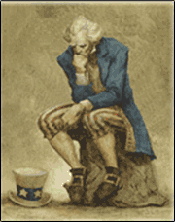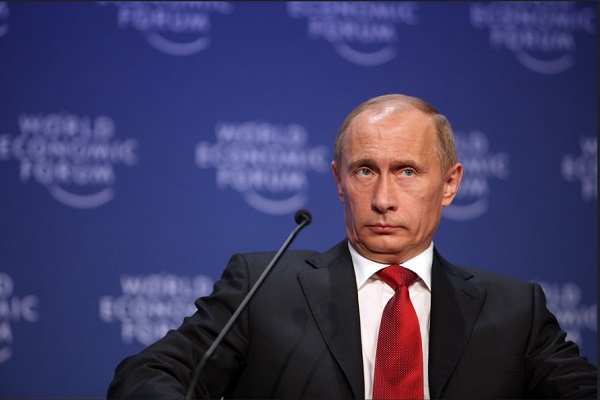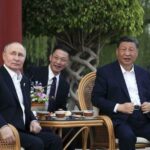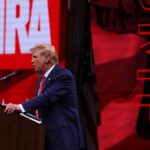
(function(d, s, id) { var js, fjs = d.getElementsByTagName(s)[0]; if (d.getElementById(id)) return; js = d.createElement(s); js.id = id; js.src = “https://connect.facebook.net/en_US/sdk.js#xfbml=1&version=v3.0”; fjs.parentNode.insertBefore(js, fjs); }(document, ‘script’, ‘facebook-jssdk’)); –>
–>
August 3, 2023
Vladimir Putin is not a great statesman. His admirers don’t want to admit this. But the last 17 months of war have made it hard to keep up the illusion.
‘); googletag.cmd.push(function () { googletag.display(‘div-gpt-ad-1609268089992-0’); }); document.write(”); googletag.cmd.push(function() { googletag.pubads().addEventListener(‘slotRenderEnded’, function(event) { if (event.slot.getSlotElementId() == “div-hre-Americanthinker—New-3028”) { googletag.display(“div-hre-Americanthinker—New-3028”); } }); }); }
There are a lot of Americans who are happy about the ineptitude of Russia’s leadership class. I am not one of them.
The fact is that the United States and Russia are kindred civilizations, springing from the same cultural rootstock in Christian Europe. In the twentieth century, both nations fell under the control of forces that have done their best to destroy that heritage; now both countries have political factions that want to reverse that decline. Real American patriots and traditionalists have reasons to cheer on Russia’s successes, and vice versa.
For better or worse, Putin has spent the last 24 years as the leader of Russia’s traditionalist, restoration-minded faction.
‘); googletag.cmd.push(function () { googletag.display(‘div-gpt-ad-1609270365559-0’); }); document.write(”); googletag.cmd.push(function() { googletag.pubads().addEventListener(‘slotRenderEnded’, function(event) { if (event.slot.getSlotElementId() == “div-hre-Americanthinker—New-3035”) { googletag.display(“div-hre-Americanthinker—New-3035”); } }); }); }
From Boris Yeltsin, who spent most of his presidency drunk, Vladimir Putin inherited a shambles of a country. In 1999, the Russian fertility rate was 1.19. GDP was 38 percent of what it was when the Soviet Union fell. Corruption and crime were rampant. Life expectancy had fallen from 67.6 years to 65.0, driven mainly by alcoholism.
President Putin recognized the severity of the situation. Upon coming to power, he cracked down on crime, limited the power of plutocrats and foreign investors, and rebuilt many of the public industries that had been allowed to decay at the bidding of globalist advisers from the Clinton administration. As a result, the GDP, the fertility rate, and the life expectancy all went up.
But the revival lasted only so long. Russia’s fertility rate peaked at 1.76 in 2016, then resumed declining. Exports peaked in 2012, then entered a ragged plateau. Despite huge state support for the Russian Orthodox Church, only some 7 percent of Russians attend services weekly.
And over the last decade or so, Putin has responded to these failures by becoming increasingly bitter, obsessing over the decadence and perfidy of NATO and the West in general, and blaming foreigners for his country’s problems.
What he has not done is to crack down on the corruption and cronyism that make Russia an unattractive place to do business, and which have left the country stuck with a quasi-third-world economy based mainly on raw materials extraction rather than manufacturing. Nor has Putin made any real effort to stamp out electoral fraud, or create a multiparty political system with legislatures strong enough to hold ministers accountable for their abuses — this, despite the fact that his party is popular enough that it would probably stay in power even with clean elections.
Putin’s most die-hard apologists respond to this kind of thing by saying that democracy is a sort of corroding agent that weakens the authority of the state, so Putin is right to be suspicious of it. But the evidence doesn’t bear this out; in real life, one-party rule creates a culture of flattery, where high officials like Putin and his defense minister, Sergei Shoigu, never have to face serious criticism for their missteps and can perform their duties in a slovenly or negligent manner until a foreign adversary hands them a humiliating defeat.
‘); googletag.cmd.push(function () { googletag.display(‘div-gpt-ad-1609268078422-0’); }); document.write(”); googletag.cmd.push(function() { googletag.pubads().addEventListener(‘slotRenderEnded’, function(event) { if (event.slot.getSlotElementId() == “div-hre-Americanthinker—New-3027”) { googletag.display(“div-hre-Americanthinker—New-3027”); } }); }); } if (publir_show_ads) { document.write(“
And yet Putin and Putinism remain popular. Why? Ironically, most American liberals are now echoing George W. Bush and saying that this is because there are just a lot of people in the world who hate America and America’s freedoms. I, on the other hand, say it’s because Putin’s criticisms of the West and its decadence are mostly true.
After all, it really is possible — as I’ve explained at length before — for both sides in a conflict to be mostly telling the truth about the other side.
So when Russians see the United States fighting a bloody and unnecessary war in Iraq, based on WMD claims that a lot of people always knew were a hoax, they conclude that American global hegemony isn’t a good thing after all. Ditto when they see the Obama-era State Department loudly bellowing about democracy while organizing a coup against Ukraine’s elected government for being too pro-Russian. (Let’s face it: without the 2014 coup, and the resulting secession of the parts of Ukraine that viewed the new government as an illegitimate puppet, the 2022 war would never have happened.)
And when the American regime dedicates the whole month of June (and a goodly portion of every other month) to celebrating every kind of sexual relationship except the kind that allows the next generation to be born — or when President Biden uses his bully pulpit to proclaim that one of the key human rights struggles of our day is to make sure that children of any age have the right to be chemically or surgically sterilized in order to more closely resemble the opposite sex — well, you get the idea.
And then of course there was the humiliating Afghanistan debacle, which seemed to show everyone that the American empire was also rather weak.
So patriotic Russians see the lies that the West is peddling, assume everything that comes out of Washington, New York, and London must be bad, and rally behind Putin.
This is a tragedy, because Putin’s regime has plenty of flaws of its own, and Vladimir Putin has by now shown himself to be quite incapable of leading Russia through the present crisis.
Putin probably sees himself as a twenty-first-century version of Otto von Bismarck, the great German chancellor who, in the 1860s, united a bunch of squabbling German states under the leadership of his native Prussia, modernized Germany’s political institutions, industrialized its economy, and capped off his project by leading Germany to a series of swift military victories in well planned wars against Denmark, then Austria, then France, each time annexing ethnically German territories that he considered rightfully his.
But the difference between Bismarck and Putin is that Putin’s institutions are built of mud. Also, in his biggest military venture, Putin grossly underestimated his enemy, turning what was supposed to be a month-long war — at the longest! — into a multiyear struggle marked by bad logistics and weak generals who are constantly feuding with one another and having to be replaced.
Nor has Russia’s dishonest and — let’s face it — whiny messaging about the war helped anyone. One of the things that made me lose a lot of respect for Vladimir Putin was seeing how, ever since February of 2022, he has demanded that everyone in Russia call his war a “special military operation” and imposed stiff legal penalties for calling it an “invasion” or a “war.”
Look through the records of the great statesmen of the past — men like William Pitt, Napoleon Bonaparte, and Otto von Bismarck — and you will find plenty of speeches about how the wars into which they led their countries were “just and necessary.” What you won’t find is any of these men insisting that his war isn’t a war.
And then if you go onto a Russian news site like SputnikNews, you will find plenty of articles condemning the “terrorism” of Ukraine — basically, articles in which every minor act of sabotage against Russian infrastructure is spun into a story of the innocent Russians suffering something like 9/11.
This is not how serious statesmen — or serious countries — behave in wartime. If you punch someone, and you get punched back. You don’t get to whine about it.
Then, in late June of 2023, things took an even stranger turn. Into the leadership gap stepped Yevgeny Prigozhin, a man who, until then, few Westerners had heard of.
Prigozhin began his career as a thief, doing prison time during the waning days of the USSR. After his release in the 1990s, he showed a flair for business and ended up as owner of several companies, including some restaurants that did catering for the Kremlin. From this starting point, Prigozhin became Putin’s confidant, and along with the intelligence officer Dmitri Utkin, he founded the Wagner Group, which has been fighting in Russia’s wars since 2014.
Then, on June 24, Prigozhin led a mutiny in which his men — who claim they have been ill used by the regular army all throughout the war — captured Rostov without resistance, shot down several helicopters, and marched almost to the edge of Moscow before turning back for reasons that still aren’t clear.
Ultimately, the coup failed, but no one knows exactly why. It certainly wasn’t due to determined resistance on the part of the regular army, who didn’t block Prigozhin’s advance even after he had shot down several of their aircraft. Nor did Putin himself show much courage; when he got word that the mercenaries were on the march, he left the capital on a jet bound for St. Petersburg.
Perhaps Prigozhin panicked when he realized that nobody from within the Russian state was joining his cause, and that even if he captured Moscow, he had no plan for what came next. Perhaps the rumors are true that Putin had threatened to harm Prigozhin’s family if he didn’t stand down.
Even a month after the fact, the details of what happened are still a matter of speculation. After the mutiny, Prigozhin fled to Belarus, whose president, the off-and-on Putin ally Alexander Lukashenko, did his best to serve as a mediator in their “dispute.” Meanwhile, Putin pardoned the rest of the Wagner Group and tried his best to resume the war with Ukraine as if this had never happened. (After all, the Wagner mercenaries are still more competent than the regular army, and Putin knows this.) At some point, Prigozhin reappeared in Russia, where Putin seems to have made no attempts to punish him.
Russia’s entire recent history has a surreal feeling to it, as if we were all watching a barfight in which the fighters take wild swings at each other but are too drunk to land any punches, though some of them fall over anyway.
Putin certainly comes off looking weak, but hopeful Westerners shouldn’t forget that in the end, Prigozhin also panicked and fled. If Putin is a wannabe Bismarck, then Prigozhin is a wannabe Alaric, the Germanic king who famously sacked Rome in A.D. 410 — the first time in about 800 years that the imperial city was breached by foreigners.
When most people think of Alaric, they probably imagine the leader of a pagan barbarian horde pouring down from the steppes to do battle against his timeless Roman foes. But in real life, Alaric’s Goths were Christians, just like the Romans. Like a lot of other Germanic chieftains, Alaric had been hired by the Romans to patrol their borders and fight their real enemies (at this moment, the Franks and the Alans). The Visigoths were mercenaries. When they revolted and pillaged Rome, it was in retribution for their having not been paid.
This is how empires fall. Not in a single, dramatic moment — Rome had been declining since long before Alaric’s fateful march. And even after the capital had been captured and looted (then promptly returned to Roman control, in exchange for land for the Goths to settle on), it still took the Western Roman Empire 66 years to finish disintegrating.
The slowness of imperial decline is a topic I’ve written about before. The end result is that when this kind of thing goes on for long enough, the empire does fall.
Some Americans are gloating about what has happened to Russia, but they shouldn’t be. In the first place, we shouldn’t be happy about Russia’s struggles because the Russians are a kindred nation to us, sharing a common heritage of Christian civilization, with patriots who want most of the same things for their country that we American patriots want for ours.
But they also shouldn’t be gloating because, while Russia is farther along the path of decline, the United States is, in many ways, treading the same track.
Right now, the United States is experiencing record-low fertility — somewhere below 1.7 births per woman. Church attendance is at all-time lows, and life expectancy is declining. In the last twenty years, America has fought two large, bloody, and unnecessary wars, while at home, various kinds of maladministration have caused much of the economy to rust shut, making it nearly impossible to build new infrastructure, even as the manufacturing sector shrinks to a shadow of what it was fifty years ago.
Meanwhile, the aristocratic rule of liberal judges — such as the numerous judges who have struck down various state laws against sex changes for minors — is just as effective as Putin’s ballot box–stuffing as a means of denying the common people a say in how they are governed.
The present administration is largely content with this state of affairs; indeed, for Joe Biden and his followers, it seems that the main things to complain about are that police (and bystanders) sometimes use violence to stop crimes, and that some states won’t let small children attend strip shows.
It is up to us American patriots to realize what is going on, and to make our country change course, and change course fast. Otherwise, the kinds of things that are happening in Russia will eventually happen here. And even if we Americans never get a Bismarck, we will, sooner or later, get our Alaric. The day will come when we all find out that some rogue mercenary has captured an American city, and that nobody cared enough to stop him.

Image: World Economic Forum via Flickr, CC BY-NC-SA 2.0.
<!–
–>
<!– if(page_width_onload <= 479) { document.write("
“); googletag.cmd.push(function() { googletag.display(‘div-gpt-ad-1345489840937-4’); }); } –> If you experience technical problems, please write to [email protected]
FOLLOW US ON
<!–
–>
<!– _qoptions={ qacct:”p-9bKF-NgTuSFM6″ }; ![]() –> <!—-> <!– var addthis_share = { email_template: “new_template” } –>
–> <!—-> <!– var addthis_share = { email_template: “new_template” } –>





